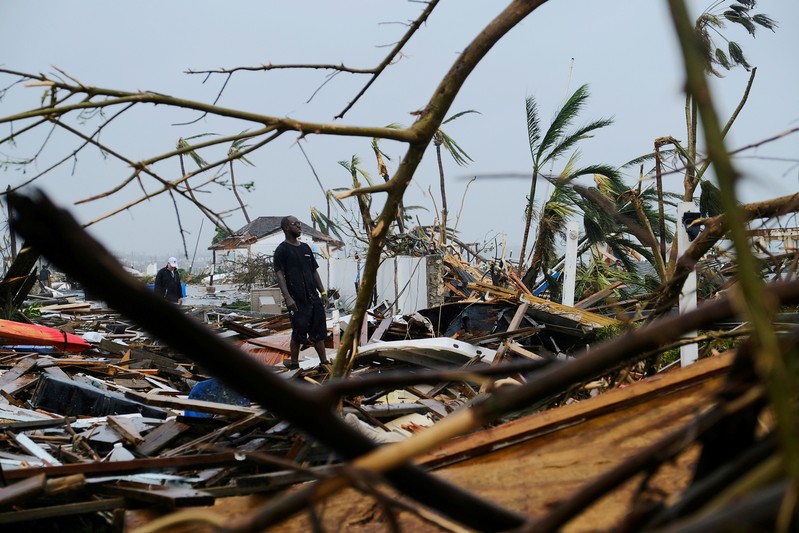
FILE PHOTO: Damage in the aftermath of Hurricane Dorian on the Great Abaco island town of Marsh Harbour, Bahamas, September 2, 2019. REUTERS/Dante Carrer/File Photo
September 6, 2019
By Nick Brown
MARSH HARBOUR, Bahamas (Reuters) – The smell of death hung over parts of Great Abaco Island in the northern Bahamas on Friday, as relief workers sifted through the debris of shattered homes and buildings in a search expected to dramatically drive up the death toll from Hurricane Dorian.
Dorian, the most powerful hurricane on record to hit the Bahamas, swept through the Abaco Islands and Grand Bahama Island earlier this week, leveling entire neighborhoods and knocking out key infrastructure, including airport landing strips and a hospital.
Hundreds, if not thousands, are still missing in the country of about 400,000 people, and officials say the death toll, which stands at 30, is likely to shoot up as more bodies are discovered in the ruins and floodwaters left behind by the storm.
“You smell the decomposing bodies as you walk through Marsh Harbour,” said Sandra Sweeting, 37, in an interview amid the wreckage on Great Abaco. “It’s everywhere. There are a lot of people who aren’t going to make it off this island.”
Some locals called the government’s initial official death toll a tragic underestimate.
“I work part-time in a funeral home. I know what death smells like,” said Anthony Thompson, 27. “There must be hundreds. Hundreds.”
Chaotic conditions around the islands were interfering with flights and boats, hampering relief efforts.
The medical chief of staff of Bahamas’ only functioning public hospital said the death toll would be “staggering,” and two refrigerated, 40-foot trucks would be needed to hold the bodies that were expected to be found.
“We’ve ordered lots of body bags,” Dr. Caroline Burnett-Garraway said in an interview at Princess Margaret Hospital in Nassau, the country’s capital. Processing all the dead will take weeks, she added.
Those injured by the storm, which at one point was a Category 5 hurricane on the five-step Saffir-Simpson scale of intensity, were being treated for fractures, head injuries, deep lacerations, skin rashes and dehydration.
Survivors are also dealing with the emotional trauma triggered by the horrors of the preceding days.
Near an area called The Mudd at Marsh Harbour, the commercial hub of Great Abaco, a Reuters photographer described a devastating scene, with most houses leveled, a man lying dead near a main street and dead dogs in water. Some residents were leaving the area with meager possessions, while others were determined to remain.
Medical facilities in Grand Bahama, the Abacos and Nassau were “coping, so far” with the injured, said Aubynette Rolle of the Bahamas Public Hospitals Authority.
Rolle said urgent care was being provided on the hurricane-hit islands while makeshift clinics were dealing with non-urgent casualties. A triage system has been set up at a Nassau airport to direct more critical patients to Princess Margaret Hospital.
Around 250 evacuees from Abaco arrived in Nassau by boat on Friday afternoon, and a further 250 were expected later in the day, the National Voice of the Bahamas radio station reported, citing a spokesman for the country’s National Emergency Management Agency.
There were reports of chaotic scenes at the harbor in Freeport, Grand Bahama as many Bahamians tried to get on a Bahamas Paradise Cruise Line ship which is taking evacuees for free to West Palm Beach, Florida.
HUMANITARIAN RESPONSE
Shelter material for hundreds of people as well as hygiene kits including basic items like soap were unloaded from the British ship RFA Mounts Bay and distributed in Marsh Harbour, the United Kingdom’s Department for International Development said on Friday.
British forces are also distributing water from supplies aboard the ship, which has a system to turn sea water into drinking water.
The U.S. Coast Guard, working with the National Emergency Management Agency in the Bahamas, has rescued 295 people since Dorian began, the U.S. embassy in Nassau tweeted.
Relief groups are focusing on getting doctors, nurses and medical supplies into the hardest-hit areas and helping survivors get food and safe drinking water.
The risk of outbreaks of diarrhea and waterborne diseases is high because drinking water may be contaminated with sewage, according to the Pan American Health Organization, which described the situation for some people on Abaco as “desperate.”
The United Nations estimated 70,000 people were in immediate need of food, water and shelter on the islands. A Reuters photographer saw widespread looting on Abaco, with people breaking into supermarkets and liquor stores.
Wendy Hawkes, whose home on Abaco was largely destroyed, described seeing neighbors standing outside their front doors with shotguns to ward off looters.
The relief effort faces formidable logistical challenges because of the widespread destruction of Dorian, which hovered over the Bahamas for nearly two days with torrential rains and fierce winds that whipped up 12- to 18-foot (3.7- to 5.5-meter) storm surges.
The storm made landfall on the Outer Banks of North Carolina on Friday with winds of 90 miles per hour (150 kph).
The U.N. World Food Programme is airlifting storage units, generators, prefab offices, and satellite equipment as well as 8 metric tonnes of ready-to-eat meals.
Famed Spanish-born chef Jose Andres tweeted on Friday that a 225-foot ship he chartered in Florida to help serve hot meals to tens of thousands of hurricane survivors had arrived in Grand Bahama.
“Freeport team is already on the ground cooking paella!” tweeted Andres, whose organization World Central Kitchen hopes to set up kitchens to serve up to 50,000 meals a day on Grand Bahama and the Abacos within days.
(Reporting by Nick Brown in Sandy Point, Bahamas, additional reporting by Dante Carrer and Marco Bello in Marsh Harbour, Bahamas, Zachary Fagenson in Nassau, Bahamas, and Peter Szekely, Michelle Nichols, Maria Caspani and Matthew Lavietes in New York and Andrew Hay in New Mexico; Writing by Paul Simao; Editing by Cynthia Osterman and Alistair Bell)

